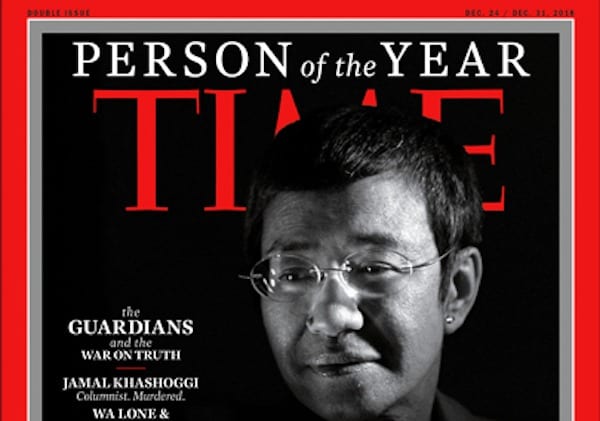She’s been named as part of TIME’s 2018 Person of the Year special, one of a number of journalists labelled as “The Guardians”, including murdered Washington Post contributor and Saudi journalist Jamal Khashoggi, the staff of Capital Gazette who were killed during a June Shooting in Annapolis, and the two Reuters journalists, Wa Lone and Kyaw Soe Oo, imprisoned by Myanmar’s Government. They will feature across four different covers in January.
Ressa’s 33 year career in journalism, including as a CNN bureau chief, has seen her dodge enemy fire while reporting on war zones and, more recently, become a vocal critic of social media platforms like Facebook regarding its influence on democracy.
In November, her site was charged with tax fraud, which could see Ressa imprisoned for ten years. The charges are largely seen as an attempt to silence the press by the government.
Recently, she was presented with an international Press Freedom award. As she took to the stage to accept it, she said: “You don’t really know who you are until you are forced to defend it.”
Writing about Ressa, the TIME editors said:
“In the Philippines, a 55-year-old woman named Maria Ressa steers Rappler, an online news site she helped found, through a superstorm of the two most formidable forces in the information universe: social media and a populist President with authoritarian inclinations.
TIME magazine names a group of journalists “who have taken great risks in pursuing the truth” as 2018 Person of the Year. The journalists include Jamal Khashoggi, Maria Ressa and staff of the Capital Gazette. https://t.co/iiGzZKHl0J
— Twitter Moments (@TwitterMoments) December 11, 2018
“Rappler has chronicled the violent drug war and extrajudicial killings of President Rodrigo Duterte that have left some 12,000 people dead, according to a January estimate from Human Rights Watch. The Duterte government refuses to accredit a Rappler journalist to cover it, and in November charged the site with tax fraud, allegations that could send Ressa to prison for up to 10 years.”
Ressa told CNN in response to the announcement that it felt “bittersweet” and daunting. “We know it’s a tough time to be a journalist. But I think what strengthens all of us is that there is probably no better time to be a journalist, because this is when we live our values and we live our mission.”
She said that currently in the Philippines there are “exponential attacks on social media” as well as an “inciting to hate just for doing your job”.
She told TIME the Phillipines is “ground zero” for the world’s current war on disinformation. “The kind of civil discourse that used to be necessary for democracy—one, we all agreed on facts, two, we actually exchanged ideas—this is gone.”
In 2012, when she founded Rappler, social media was seen as a tool of new possibilities for opening civil engagement. A third of the population of the Phillipines was on Facebook, today that figure is 97% of the internet-connected population according to TIME, thanks to the help of Facebook being free to access on mobile phones. Ressa believes Facebook has failed to protect the country’s user-base from manipulation, as the Duterte administration has used social media to try and control public opinion.
“Technology has no morals and values,” she told TIME. “And the group that actually figured out how to use it and weaponize it, are the authoritarian style leaders.”
TIME has named a Person of the Year annually since 1927 — although they have normally been individuals and usually male (it was previously called ‘Man of the Year’). This year’s feature follows 2017’s winner, ‘The Silence Breakers’ who were used to define the #MeToo movement.
TIME selected the journalists for their work in “taking great risks in pursuit of greater truths, for the imperfect but essential quest for facts that are central to civil discourse, for speaking up and speaking out.”
“You don’t really know who you are until you’re forced to fight to defend it.” Thank you @mariaressa Fuel for the fight. https://t.co/iRp7dVJn2A via @YouTube
— Betsy Joles (@BetsyJoles) December 10, 2018
In an essay for the magazine, editor-in-chief Edward Felsenthal said TIME selected the journalists, “For taking great risks in pursuit of greater truths, for the imperfect but essential quest for facts that are central to civil discourse, for speaking up and speaking out”.
The final decision for ‘Person of the Year’ is made by TIME editors, although online polls are conducted to assist. US President Donald Trump was named second runner-up, while Robert Mueller, the FBI special counsel investigating alleged meddling by Russia into the 2016 presidential elections was named the third runner up.
Christine Blasey Ford was a finalist and considered a strong contender, as were the March For Our Lives activists.


